Sample charts
This article contains sample charts along with the respective data description and presentation XML strings. You can specify the:
- Data description XML string for a chart using the
SavedQueryVisualization.DataDescriptionorUserQueryVisualization.DataDescriptionfor the organization-owned or user-owned chart respectively. - Presentation description XML string for a chart using the
SavedQueryVisualization.PresentationDescriptionorUserQueryVisualization. PresentationDescriptionfor the organization-owned or user-owned chart respectively.
Column chart
The following is a column chart that shows the account by industry. We modified the presentation description of the existing Account By Industry default chart available in model-driven apps for the Account table to change it to a column chart.
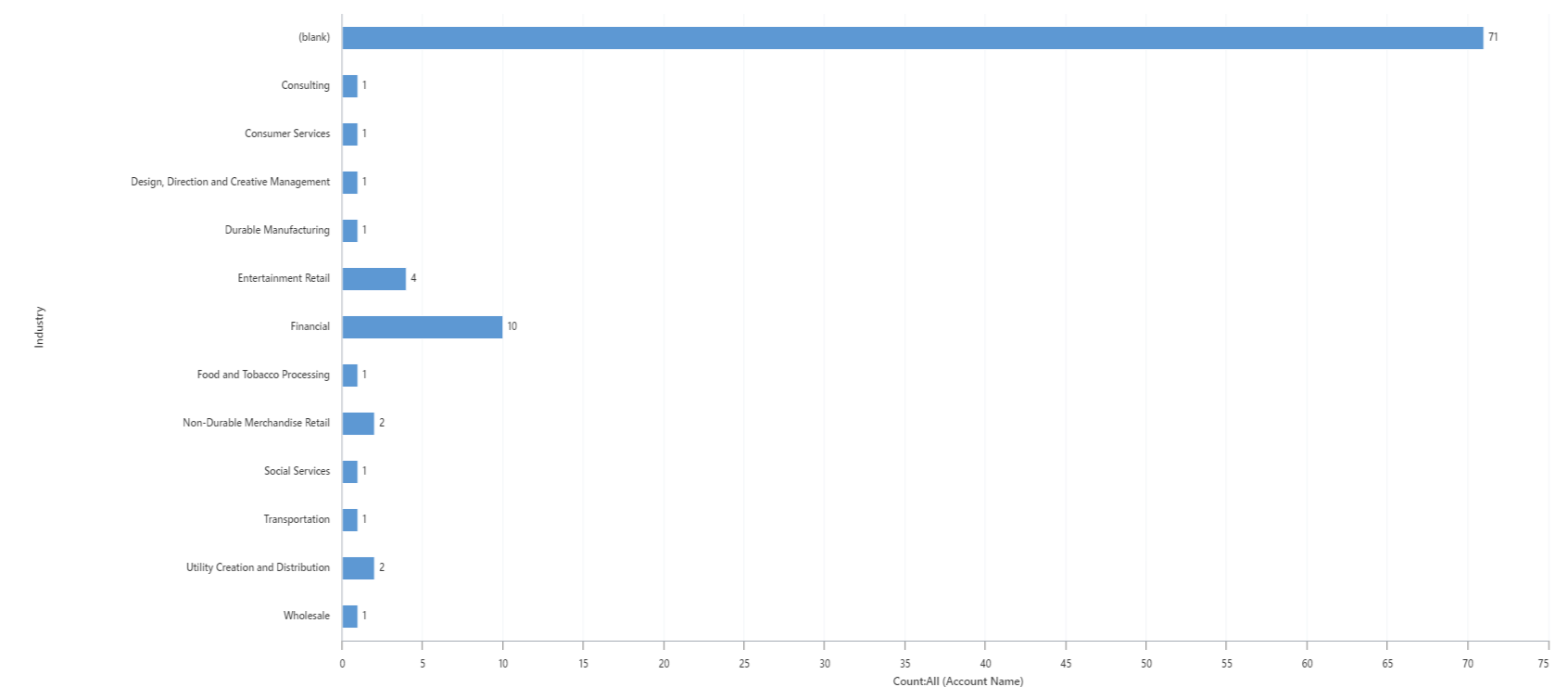
Column chart data description
The following is the contents of the data description XML string for this chart.
<datadefinition>
<fetchcollection>
<fetch mapping="logical" aggregate="true">
<entity name="account">
<attribute groupby="true" alias="groupby_column" name="industrycode" />
<attribute alias="aggregate_column" name="name" aggregate="count" />
</entity>
</fetch>
</fetchcollection>
<categorycollection>
<category>
<measurecollection>
<measure alias="aggregate_column" />
</measurecollection>
</category>
</categorycollection>
</datadefinition>
Column chart presentation description
The following is the contents of the presentation description XML string for this chart.
<Chart>
<Series>
<Series ChartType="Column" IsValueShownAsLabel="True" Color="91, 151, 213" BackSecondaryColor="112, 142, 50" Font="{0}, 9.5px" LabelForeColor="59, 59, 59" CustomProperties="PointWidth=0.75, MaxPixelPointWidth=40">
<SmartLabelStyle Enabled="True" />
</Series>
</Series>
<ChartAreas>
<ChartArea BorderColor="White" BorderDashStyle="Solid">
<AxisY LabelAutoFitMinFontSize="8" TitleForeColor="59, 59, 59" TitleFont="{0}, 10.5px" LineColor="165, 172, 181" IsReversed="False">
<MajorGrid LineColor="239, 242, 246" />
<LabelStyle Font="{0}, 10.5px" ForeColor="59, 59, 59" />
</AxisY>
<AxisX LabelAutoFitMinFontSize="8" TitleForeColor="59, 59, 59" TitleFont="{0}, 10.5px" LineColor="165, 172, 181" IsReversed="False">
<MajorGrid Enabled="False" />
<MajorTickMark Enabled="False" />
<LabelStyle Font="{0}, 10.5px" ForeColor="59, 59, 59" />
</AxisX>
</ChartArea>
</ChartAreas>
<Titles>
<Title Name="Chart Title" DockingOffset="-3" Font="{0}, 13px" ForeColor="59, 59, 59" Alignment="TopLeft" />
</Titles>
</Chart>
Bar chart
The following is a bar chart that shows the top 10 customers. This is one of the default charts available in model-driven apps for the Opportunity table.
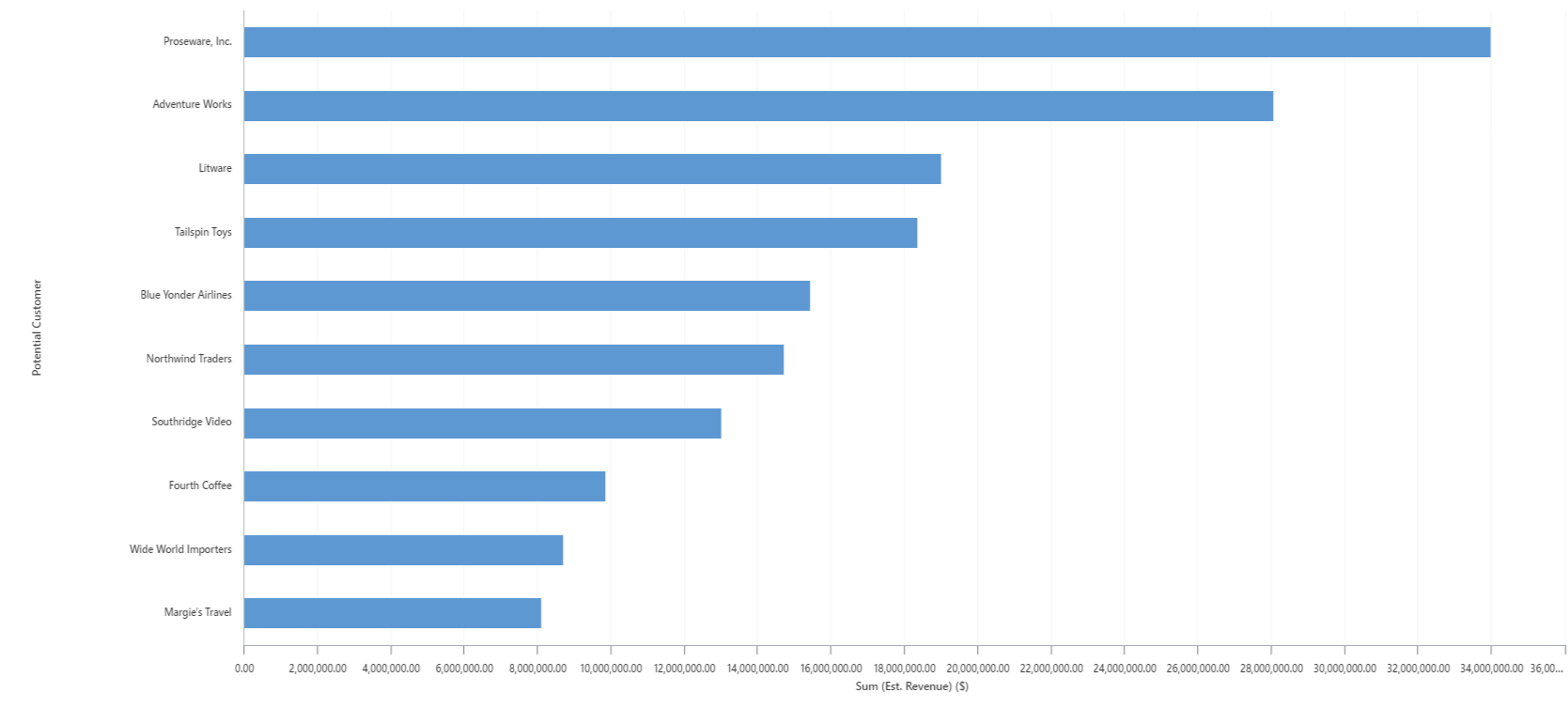
Bar chart data description
The following is the contents of the data description XML string for this chart.
<datadefinition>
<fetchcollection>
<fetch mapping="logical" count="10" aggregate="true">
<entity name="opportunity">
<attribute name="estimatedvalue" aggregate="sum" alias="sum_estimatedvalue" />
<attribute name="customerid" groupby="true" alias="customerid" />
<order alias="sum_estimatedvalue" descending="true" />
</entity>
</fetch>
</fetchcollection>
<categorycollection>
<category>
<measurecollection>
<measure alias="sum_estimatedvalue" />
</measurecollection>
</category>
</categorycollection>
</datadefinition>
Bar chart presentation description
The following is the contents of the presentation description XML string for this chart.
<Chart>
<Series>
<Series ChartType="Bar" IsValueShownAsLabel="False" Color="91, 151, 213" BackSecondaryColor="112, 142, 50" Font="{0}, 9.5px" LabelForeColor="59, 59, 59" CustomProperties="PointWidth=0.75, MaxPixelPointWidth=40">
<SmartLabelStyle Enabled="True" />
</Series>
</Series>
<ChartAreas>
<ChartArea BorderColor="White" BorderDashStyle="Solid">
<AxisY LabelAutoFitMinFontSize="8" TitleForeColor="59, 59, 59" TitleFont="{0}, 10.5px" LineColor="165, 172, 181" IsReversed="False">
<MajorGrid LineColor="239, 242, 246" />
<LabelStyle Font="{0}, 10.5px" ForeColor="59, 59, 59" />
</AxisY>
<AxisX LabelAutoFitMinFontSize="8" TitleForeColor="59, 59, 59" TitleFont="{0}, 10.5px" LineColor="165, 172, 181" IsReversed="False">
<MajorGrid Enabled="False" />
<MajorTickMark Enabled="False" />
<LabelStyle Font="{0}, 10.5px" ForeColor="59, 59, 59" />
</AxisX>
</ChartArea>
</ChartAreas>
<Titles>
<Title DockingOffset="-3" Font="{0}, 13px" ForeColor="59, 59, 59" Alignment="TopLeft" />
</Titles>
</Chart>
Area chart
The following is an area chart that shows the number of records generated between a given date range.
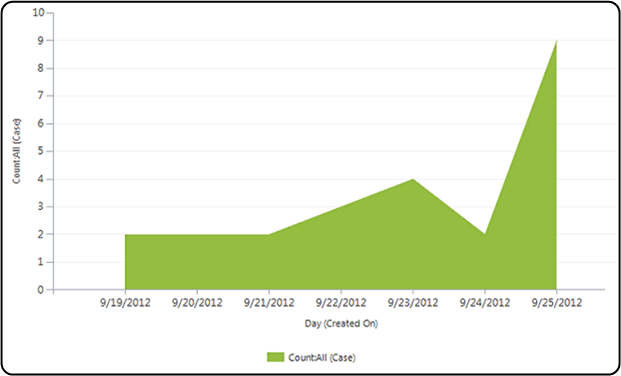
Area chart data description
The following is the contents of the data description XML string for this chart.
<datadefinition>
<fetchcollection>
<fetch mapping="logical" aggregate="true">
<entity name="incident"><order alias="groupby_column" descending="false" />
<attribute alias="aggregate_column" name="incidentid" aggregate="count" />
<attribute groupby="true" alias="groupby_column" dategrouping="day" name="createdon" />
<attribute groupby="true" alias="groupby_priority" name="prioritycode" />
</entity>
</fetch>
</fetchcollection>
<categorycollection>
<category>
<measurecollection>
<measure alias="aggregate_column" />
</measurecollection>
</category>
</categorycollection>
</datadefinition>
Area chart presentation description
The following is the contents of the presentation description XML for this chart.
<Chart Palette="None" PaletteCustomColors="91,151,213; 237,125,49; 160,116,166; 255,192,0; 68,114,196; 112,173,71; 37,94,145; 158,72,14; 117,55,125; 153,115,0; 38,68,120; 67,104,43; 124,175,221; 241,151,90; 186,144,192; 255,205,51; 105,142,208; 140,193,104; 50,125,194; 210,96,18; 150,83,159; 204,154,0; 51,90,161; 90,138,57;">
<Series>
<Series ChartType="StackedColumn" Font="{0}, 9.5px" LabelForeColor="59, 59, 59" CustomProperties="PointWidth=0.75, MaxPixelPointWidth=40" />
</Series>
<ChartAreas>
<ChartArea BorderColor="White" BorderDashStyle="Solid">
<AxisY LabelAutoFitMinFontSize="8" TitleForeColor="59, 59, 59" TitleFont="{0}, 10.5px" LineColor="165, 172, 181" IntervalAutoMode="VariableCount">
<MajorGrid LineColor="239, 242, 246" /><MajorTickMark LineColor="165, 172, 181" />
<LabelStyle Font="{0}, 10.5px" ForeColor="59, 59, 59" />
</AxisY>
<AxisX LabelAutoFitMinFontSize="8" TitleForeColor="59, 59, 59" TitleFont="{0}, 10.5px" LineColor="165, 172, 181" IntervalAutoMode="VariableCount">
<MajorGrid Enabled="False" /><MajorTickMark Enabled="False" />
<LabelStyle Font="{0}, 10.5px" ForeColor="59, 59, 59" />
</AxisX>
</ChartArea>
</ChartAreas>
<Titles>
<Title Alignment="TopLeft" DockingOffset="-3" Font="{0}, 13px" ForeColor="0, 0, 0" />
</Titles>
</Chart>
Line chart
The following is a line chart that shows the number of leads generated in the last five months. This is one of the default charts available in model-driven apps for the Lead table.
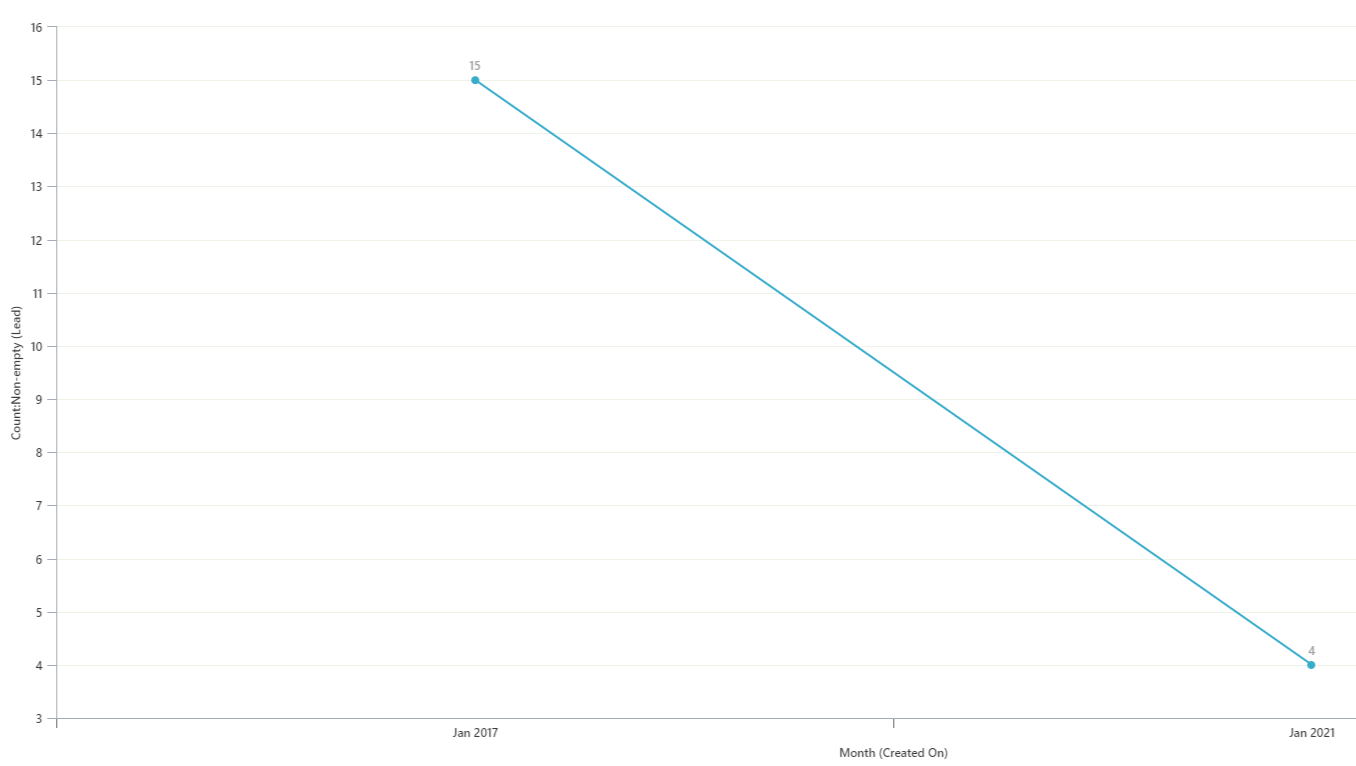
Line chart data description
The following is the contents of the data description XML string for this chart.
<datadefinition>
<fetchcollection>
<fetch mapping="logical" count="5" aggregate="true">
<entity name="lead">
<attribute name="leadid" aggregate="countcolumn" alias="count_leadid" />
<attribute name="createdon" groupby="true" dategrouping="month" usertimezone="false" alias="createdon" />
<order alias="createdon" descending="false" />
</entity>
</fetch>
</fetchcollection>
<categorycollection>
<category>
<measurecollection>
<measure alias="count_leadid" />
</measurecollection>
</category>
</categorycollection>
</datadefinition>
Line chart presentation description
The following is the contents of the presentation description XML string for this chart.
<Chart>
<Series>
<Series IsValueShownAsLabel="True" BorderWidth="3" ChartType="Line" Color="49, 171, 204" MarkerStyle="Square" MarkerSize="9" MarkerColor="37, 128, 153" />
</Series>
<ChartAreas>
<ChartArea BorderColor="White">
<AxisY LabelAutoFitMinFontSize="8" TitleForeColor="59, 59, 59" TitleFont="{0}, 10.5px" LineColor="165, 172, 181">
<MajorGrid LineColor="239, 242, 230" /><MajorTickMark LineColor="165, 172, 181" />
<LabelStyle Font="{0}, 10.5px" ForeColor="59, 59, 59" />
</AxisY>
<AxisX LabelAutoFitMinFontSize="8" TitleForeColor="59, 59, 59" TitleFont="{0}, 10.5px" LineColor="165, 172, 181">
<MajorGrid Enabled="False" />
<LabelStyle Font="{0}, 10.5px" ForeColor="59, 59, 59" />
</AxisX>
</ChartArea>
</ChartAreas>
<Titles>
<Title DockingOffset="-3" Font="{0}, 13px" ForeColor="59, 59, 59" Alignment="TopLeft" />
</Titles>
</Chart>
Pie chart
The following is a pie chart that shows the total number of leads and their importance. This is one of the default charts available in model-driven apps for the Lead table.
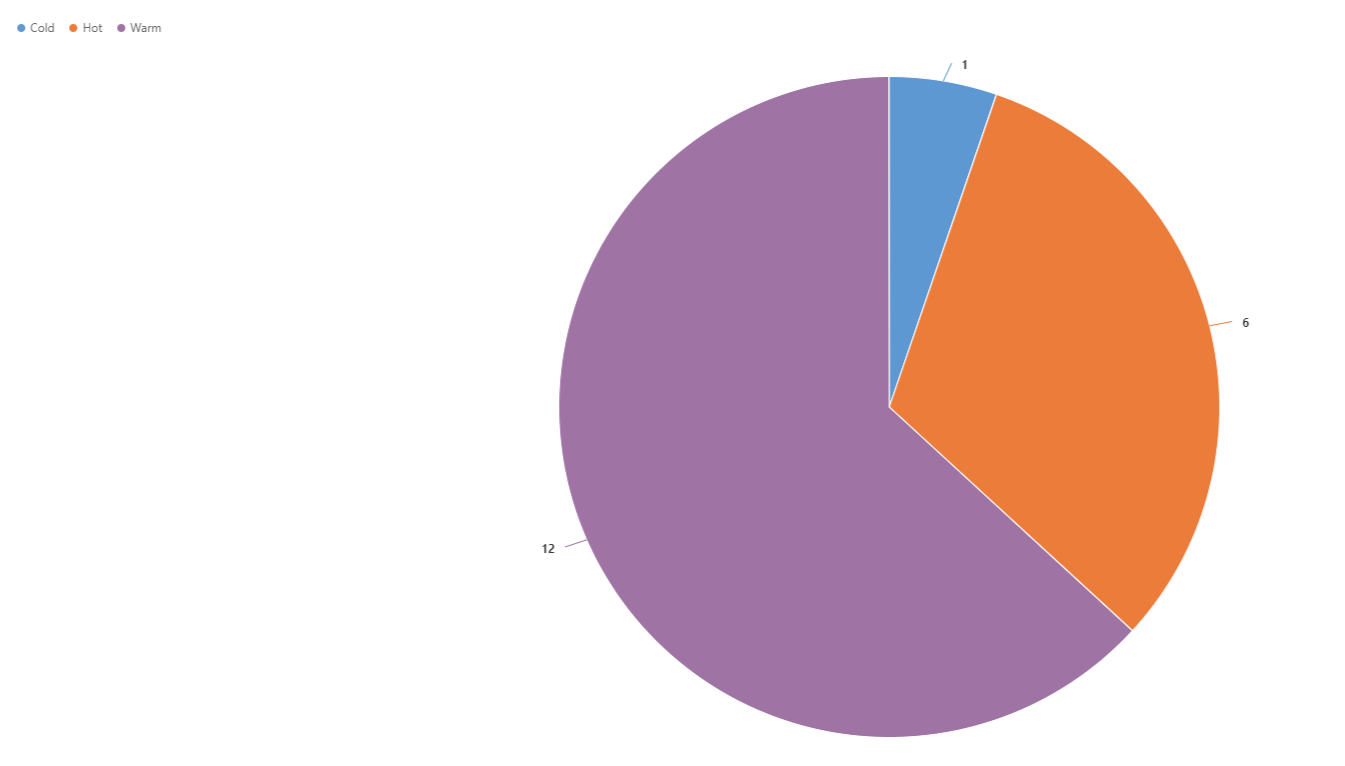
Pie chart data description
The following is the contents of the data description XML string for this chart.
<datadefinition>
<fetchcollection>
<fetch mapping="logical" aggregate="true">
<entity name="lead"><attribute groupby="true" alias="groupby_column" name="leadqualitycode" />
<attribute alias="aggregate_column" name="fullname" aggregate="count" />
</entity>
</fetch>
</fetchcollection>
<categorycollection>
<category>
<measurecollection>
<measure alias="aggregate_column" />
</measurecollection>
</category>
</categorycollection>
</datadefinition>
Pie chart presentation description
The following is the contents of the presentation description XML string for this chart.
<Chart Palette="None" PaletteCustomColors="91,151,213; 237,125,49; 160,116,166; 255,192,0; 68,114,196; 112,173,71; 37,94,145; 158,72,14; 117,55,125; 153,115,0; 38,68,120; 67,104,43; 124,175,221; 241,151,90; 186,144,192; 255,205,51; 105,142,208; 140,193,104; 50,125,194; 210,96,18; 150,83,159; 204,154,0; 51,90,161; 90,138,57;">
<Series>
<Series ShadowOffset="0" IsValueShownAsLabel="true" Font="{0}, 9.5px" LabelForeColor="59, 59, 59" CustomProperties="PieLabelStyle=Inside, PieDrawingStyle=Default" ChartType="pie">
<SmartLabelStyle Enabled="True" />
</Series>
</Series>
<ChartAreas>
<ChartArea>
<Area3DStyle Enable3D="false" />
</ChartArea>
</ChartAreas>
<Legends>
<Legend Alignment="Center" LegendStyle="Table" Docking="right" Font="{0}, 11px" ShadowColor="0, 0, 0, 0" ForeColor="59, 59, 59" />
</Legends>
<Titles>
<Title Alignment="TopLeft" DockingOffset="-3" Font="{0}, 13px" ForeColor="0, 0, 0" />
</Titles>
</Chart>
Funnel chart
The following is a funnel chart that shows the sum of estimated revenue in each stage of the sales pipeline. This is one of the default charts available in model-driven apps for the Opportunity table.
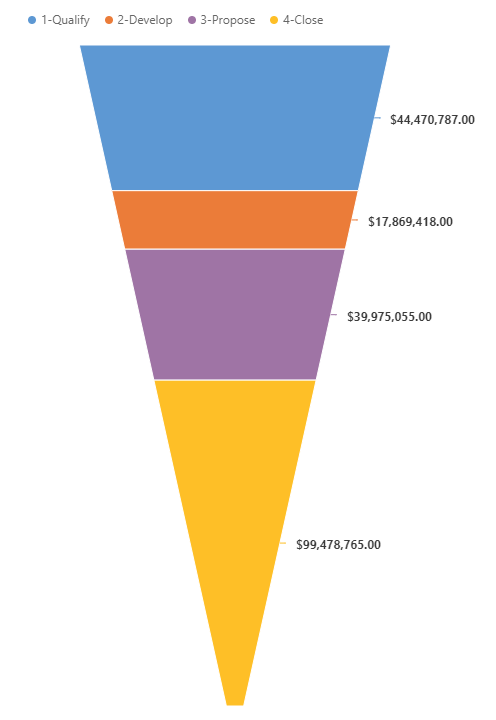
Funnel chart data description
The following is the contents of the data description XML string for this chart.
<datadefinition>
<fetchcollection>
<fetch mapping="logical" count="10" aggregate="true">
<entity name="opportunity">
<attribute name="estimatedvalue" aggregate="sum" alias="sum_estimatedvalue" />
<attribute name="stepname" groupby="true" alias="stepname" />
<order alias="stepname" descending="false" />
</entity>
</fetch>
</fetchcollection>
<categorycollection>
<category>
<measurecollection>
<measure alias="sum_estimatedvalue" />
</measurecollection>
</category>
</categorycollection>
</datadefinition>
Funnel chart presentation description
The following is the contents of the presentation description XML string for this chart.
<Chart Palette="None" PaletteCustomColors="91,151,213; 237,125,49; 160,116,166; 255,192,0; 68,114,196; 112,173,71; 37,94,145; 158,72,14; 117,55,125; 153,115,0; 38,68,120; 67,104,43; 124,175,221; 241,151,90; 186,144,192; 255,205,51; 105,142,208; 140,193,104; 50,125,194; 210,96,18; 150,83,159; 204,154,0; 51,90,161; 90,138,57;">
<Series>
<Series ShadowOffset="0" IsValueShownAsLabel="true" Font="{0}, 9.5px" LabelForeColor="59, 59, 59" ChartType="Funnel" CustomProperties="FunnelLabelStyle=Outside, FunnelNeckHeight=0, FunnelPointGap=1, FunnelNeckWidth=5">
<SmartLabelStyle Enabled="True" />
</Series>
</Series>
<ChartAreas>
<ChartArea>
<Area3DStyle Enable3D="false" />
</ChartArea>
</ChartAreas>
<Legends>
<Legend Alignment="Center" LegendStyle="Table" Docking="right" Font="{0}, 11px" ShadowColor="0, 0, 0, 0" ForeColor="59, 59, 59" />
</Legends>
<Titles>
<Title Alignment="TopLeft" DockingOffset="-3" Font="Segeo UI, 13px" ForeColor="0, 0, 0" />
</Titles>
</Chart>
Multi-Series chart
The following is a multi-series chart that shows the estimated vs. actual revenue closed by month. You can use the chart designer in model-driven apps or methods described in the developer documentation to create these types of charts.
A multi-series chart has multiple <measurecollection> elements in the data description, each mapping to the corresponding <Series> element in the presentation description XML string.
A multi-series chart has multiple <Series> elements in the presentation description; the number of <Series> elements is the same as the number of <measurecollection> elements in the data description XML string.
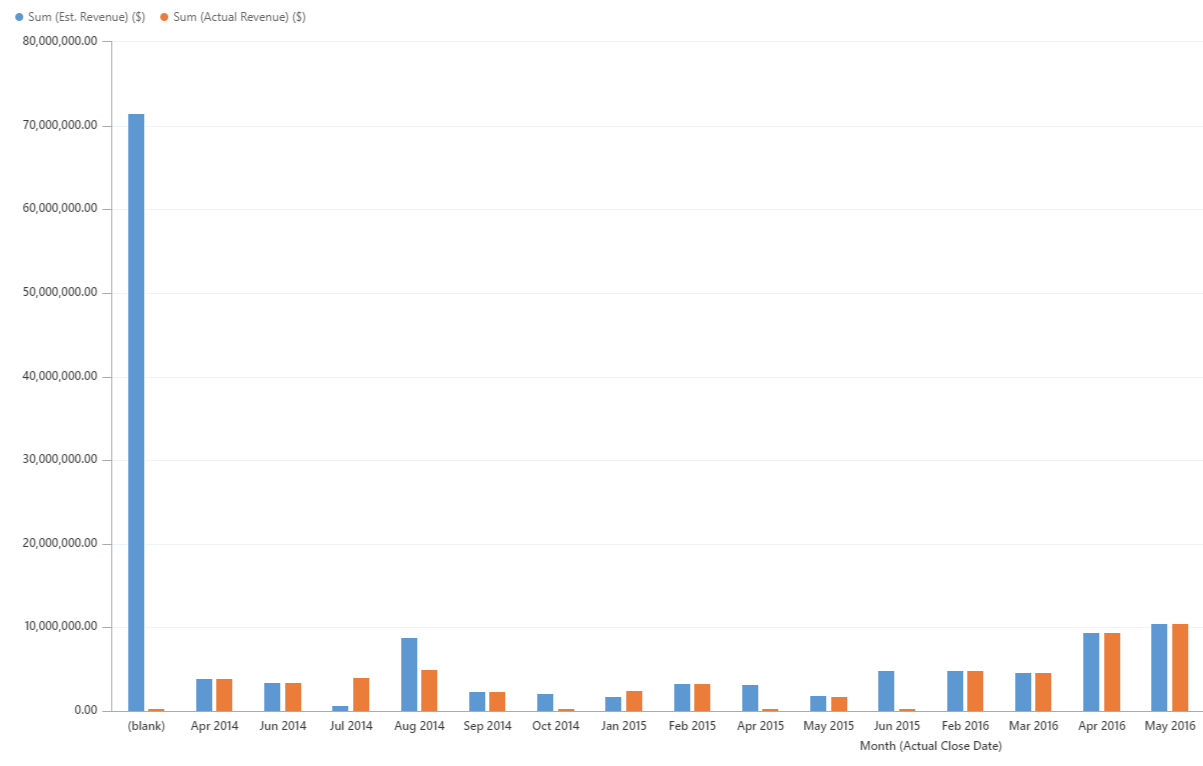
Multi-Series chart data description
The following is the contents of the data description XML string for this chart.
<datadefinition>
<fetchcollection>
<fetch mapping="logical" aggregate="true">
<entity name="opportunity">
<attribute name="estimatedvalue" aggregate="sum" alias="estvalue" />
<attribute name="actualvalue" aggregate="sum" alias="actvalue" />
<attribute name="actualclosedate" groupby="true" alias="actclosedate" dategrouping="month" />
</entity>
</fetch>
</fetchcollection>
<categorycollection>
<category>
<measurecollection>
<measure alias="estvalue" />
</measurecollection>
<measurecollection>
<measure alias="actvalue" />
</measurecollection>
</category>
</categorycollection>
</datadefinition>
Multi-Series chart presentation description
The following is the contents of the presentation description XML string for this chart.
<Chart>
<Series>
<Series Color="91, 151, 213" BackSecondaryColor="74,107,155" Font="{0}, 9.5px" LabelForeColor="59, 59, 59" CustomProperties="PointWidth=0.75, MaxPixelPointWidth=40">
<SmartLabelStyle Enabled="True" />
<Points />
</Series>
<Series Color="237, 125, 49" BackSecondaryColor="126,153,79" Font="{0}, 9.5px" LabelForeColor="59, 59, 59" CustomProperties="PointWidth=0.75, MaxPixelPointWidth=40">
<SmartLabelStyle Enabled="True" />
<Points />
</Series>
</Series>
<ChartAreas>
<ChartArea BorderColor="White" BorderDashStyle="Solid">
<AxisY LabelAutoFitMinFontSize="8" TitleForeColor="59, 59, 59" TitleFont="{0}, 10.5px" LineColor="165, 172, 181">
<MajorGrid LineColor="239, 242, 246" />
<MajorTickMark LineColor="165, 172, 181" />
<LabelStyle Font="{0}, 10.5px" ForeColor="59, 59, 59" />
</AxisY>
<AxisX LabelAutoFitMinFontSize="8" TitleForeColor="59, 59, 59" TitleFont="{0}, 10.5px" LineColor="165, 172, 181">
<MajorGrid Enabled="False" />
<MajorTickMark Enabled="False" />
<LabelStyle Font="{0}, 10.5px" ForeColor="59, 59, 59" />
</AxisX>
</ChartArea>
</ChartAreas>
<Legends>
<Legend Alignment="Center" LegendStyle="Table" Docking="Bottom" Font="{0}, 11px" ShadowColor="0, 0, 0, 0" ForeColor="59,59,59" />
</Legends>
<Titles>
<Title Alignment="TopLeft" DockingOffset="-3" Font="{0}, 13px" ForeColor="59, 59, 59" />
</Titles>
<BorderSkin PageColor="Control" BackColor="CornflowerBlue" BackSecondaryColor="CornflowerBlue" />
</Chart>
Comparison chart (Stacked Chart)
The following is a comparison chart that shows the number of activities by type and priority. You can use the chart designer in model-driven apps or methods described in the developer documentation to create these types of charts.
A comparison chart has two groupby clauses in the data description XML.
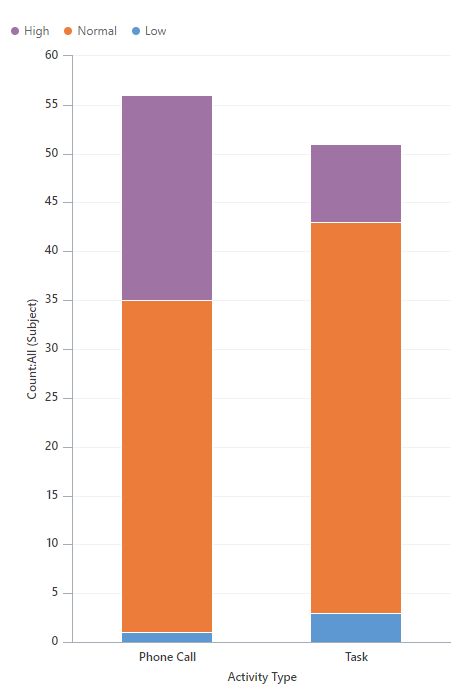
Comparison chart data description
The following is the contents of the data description XML string for this chart.
<datadefinition>
<fetchcollection>
<fetch mapping="logical" aggregate="true">
<entity name="activitypointer">
<attribute alias="aggregate_column" name="subject" aggregate="count" />
<attribute groupby="true" alias="groupby_column" name="activitytypecode" />
<attribute groupby="true" alias="groupby_priority" name="prioritycode" />
</entity>
</fetch>
</fetchcollection>
<categorycollection>
category>
<measurecollection>
<measure alias="aggregate_column" />
</measurecollection>
</category>
</categorycollection>
</datadefinition>
Comparison chart presentation description
The following is the contents of the presentation description XML string for this chart.
<Chart Palette="None" PaletteCustomColors="91,151,213; 237,125,49; 160,116,166; 255,192,0; 68,114,196; 112,173,71; 37,94,145; 158,72,14; 117,55,125; 153,115,0; 38,68,120; 67,104,43; 124,175,221; 241,151,90; 186,144,192; 255,205,51; 105,142,208; 140,193,104; 50,125,194; 210,96,18; 150,83,159; 204,154,0; 51,90,161; 90,138,57;">
<Series>
<Series ChartType="StackedColumn" Font="{0}, 9.5px" LabelForeColor="59, 59, 59" CustomProperties="PointWidth=0.75, MaxPixelPointWidth=40">
</Series>
</Series>
<ChartAreas>
<ChartArea BorderColor="White" BorderDashStyle="Solid">
<AxisY LabelAutoFitMinFontSize="8" TitleForeColor="59, 59, 59" TitleFont="{0}, 10.5px" LineColor="165, 172, 181" IntervalAutoMode="VariableCount">
<MajorGrid LineColor="239, 242, 246" />
<MajorTickMark LineColor="165, 172, 181" />
<LabelStyle Font="{0}, 10.5px" ForeColor="59, 59, 59" />
</AxisY>
<AxisX LabelAutoFitMinFontSize="8" TitleForeColor="59, 59, 59" TitleFont="{0}, 10.5px" LineColor="165, 172, 181" IntervalAutoMode="VariableCount">
<MajorGrid Enabled="False" />
<MajorTickMark Enabled="False" />
<LabelStyle Font="{0}, 10.5px" ForeColor="59, 59, 59" />
</AxisX>
</ChartArea>
</ChartAreas>
<Legends>
<Legend Alignment="Center" LegendStyle="Table" Docking="Bottom" Font="{0}, 11px" ShadowColor="0, 0, 0, 0" ForeColor="59,59,59">
</Legend>
</Legends>
<Titles>
<Title Alignment="TopLeft" DockingOffset="-3" Font="{0}, 13px" ForeColor="59, 59, 59">
</Title>
</Titles>
</Chart>
Comparison chart (100% Stacked Chart)
The following is a comparison chart that shows the number of cases opened on any date, grouped by priority. You can use the chart designer in model-driven apps or methods available in the Web Services to create these types of charts.
A comparison chart has two groupby clauses in the data description XML.
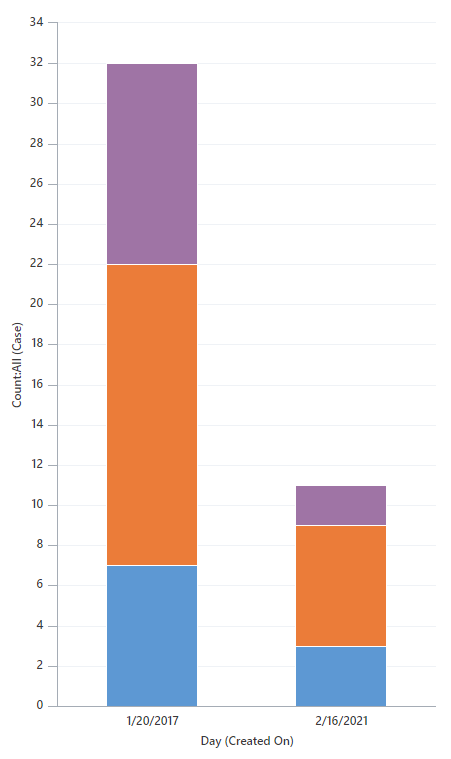
Comparison chart (100% Stacked Chart) data description
The following is the contents of the data description XML string for this chart.
<datadefinition>
<fetchcollection>
<fetch mapping="logical" aggregate="true">
<entity name="incident">
<order alias="groupby_column" descending="false" />
<attribute alias="aggregate_column" name="incidentid" aggregate="count" />
<attribute groupby="true" alias="groupby_column" dategrouping="day" name="createdon" />
<attribute groupby="true" alias="groupby_priority" name="prioritycode" />
</entity>
</fetch>
</fetchcollection>
<categorycollection>
<category>
<measurecollection>
<measure alias="aggregate_column" />
</measurecollection>
</category>
</categorycollection>
</datadefinition>
Comparison chart (100% Stacked Chart) presentation description
The following is the contents of the presentation description XML string for this chart.
<Chart Palette="None" PaletteCustomColors="149,189,66; 197,56,52; 55,118,193; 117,82,160; 49,171,204; 255,136,35; 168,203,104; 209,98,96; 97,142,206; 142,116,178; 93,186,215; 255,155,83">
<Series>
<Series ChartType="StackedBar100" Font="{0}, 9.5px" LabelForeColor="59, 59, 59" CustomProperties="PointWidth=0.75, MaxPixelPointWidth=40">
<SmartLabelStyle Enabled="True" />
</Series>
</Series>
<ChartAreas>
<ChartArea BorderColor="White" BorderDashStyle="Solid">
<AxisY LabelAutoFitMinFontSize="8" TitleForeColor="59, 59, 59" TitleFont="{0}, 10.5px" LineColor="165, 172, 181" IntervalAutoMode="VariableCount">
<MajorGrid LineColor="239, 242, 246" />
<MajorTickMark LineColor="165, 172, 181" />
<LabelStyle Font="{0}, 10.5px" ForeColor="59, 59, 59" />
</AxisY>
<AxisX LabelAutoFitMinFontSize="8" TitleForeColor="59, 59, 59" TitleFont="{0}, 10.5px" LineColor="165, 172, 181" IntervalAutoMode="VariableCount">
<MajorGrid Enabled="False" />
<MajorTickMark Enabled="False" />
<LabelStyle Font="{0}, 10.5px" ForeColor="59, 59, 59" />
</AxisX>
</ChartArea>
</ChartAreas>
<Titles>
<Title Alignment="TopLeft" DockingOffset="-3" Font="{0}, 13px" ForeColor="0, 0, 0" />
</Titles>
</Chart>
See also
Data visualization and analytics
Visualization data description schema
Create a chart
View data with visualizations (charts)